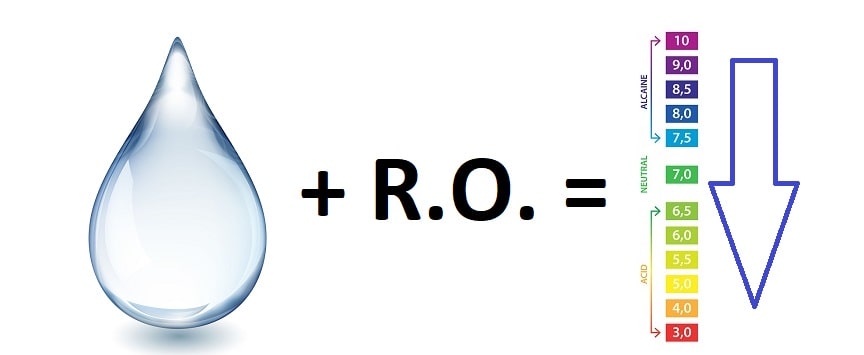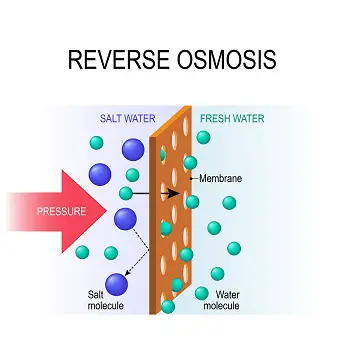You may have heard that water that is Alkaline is supposed to be much healthier for you than water that is acidic. You may already have a reverse osmosis drinking water system, or are looking into getting one, but is the water from a reverse osmosis system alkaline or acidic? How would you know?
Does Reverse Osmosis Make Water Alkaline? The process of reverse osmosis removes minerals in water that neutralize the acid in the water. Without these acid-neutralizing minerals, the water that is created by reverse osmosis will not be alkaline unless you have a reverse osmosis system with an alkalinity stage.
A reverse osmosis drinking water system is used to remove dissolved solids in water. Most people use a reverse osmosis system to reduce the amount of sodium in their water, but a reverse osmosis system will also produce acidic water. But there are ways to make it alkaline!
What is Alkaline Water?
Alkaline water is water that has the ability to neutralize the acid in water. Rather than get into the boring science of it, it simply means that water is alkaline if it is able to neutralize any acid.
Just because a water sample has a pH under 7.0, does not mean that it can no longer neutralize acid, it could get more acidic.
Now, why have I bored you with these details?
Because it is important to understand why it is believed that water that is alkaline is beneficial to our health and well being. It is widely believed that drinking water that is alkaline can help stabilize your body’s pH, making it less likely for you to get sick.
Bacteria, and many other organic materials that can cause illness to thrive in acidic conditions, just like the majority of your body. Even a slightly higher pH in your body is believed to reduce your chances of getting sick.
Our diet is highly acidic, containing beverages that are very acidic like coffee, soda, juices, and drink mixes. With all the acidic foods we consume, drinking alkaline water is believed to help balance our acidic intake.
What is the pH of the water that comes from a reverse osmosis system?
Reverse osmosis water will almost always be acidic. I say that it will almost always be acidic because it all depends on what is in the water when it goes into the reverse osmosis system.

It is a common misunderstanding that a reverse osmosis drinking water system removes all dissolved solids from the water, and leaves it totally pure. This is not the case.
A reverse osmosis system uses a semi-permeable membrane to filter out dissolved solids (like salt) from water. This membrane is essentially a fine filter, and as with any filter, some of the contaminants that are meant to be filtered out, can get past the filter, and end up in your water.
This is why most reverse osmosis filter systems state that they filter out up to 98% of the dissolved solids in your water. Now, being able to filter out 98% of the dissolved solids in your water is great, but the membrane will not work that well forever.
Just like any other filter, the mesh of a reverse osmosis membrane can loosen over time, leaving the gaps that are designed to allow the good water to go through larger than they are supposed to be.
This allows some of the minerals that were intended to be blocked to get through the membrane, and if these minerals are acid-reducing minerals like, Calcium or Magnesium, the water coming from the reverse osmosis system may not be acidic.
Also, if the amount of dissolved solids (including acid-neutralizing minerals) is very high going into the reverse osmosis system, there may still be enough coming out to make the water not be acidic.
These two scenarios are not very common, but it is important to understand just how the process of reverse osmosis works, and why the resulting water can vary from one situation to another.
How does reverse osmosis make the water acidic?
When water goes through a reverse osmosis system, the semi-permeable membrane rejects the dissolved solids in the water and rinses them away.

Calcium and Magnesium are the two primary minerals that contribute to neutralizing acid in the water, and if they are removed from the water by reverse osmosis, the water will then become acidic.
Why would you want alkaline water?
Besides the potential health benefits of drinking alkaline water, alkaline water is less aggressive than acidic water, and therefore will be less likely to absorb any harmful contaminants, like chemicals used in some reusable plastic water bottles.
Alkaline is considered to be healthier for cats and dogs as well. Many pet owners will only give there pets water that is alkaline.
Alkaline water is often used in different types of cooking as acidic water can break down fats which can add to the flavor of a dish.
Using alkaline water to add powdered drink mixes will help decrease the amount of acid in your family’s diet without them ever knowing the difference.
Are there reverse osmosis systems that produce alkaline water?
There certainly are! Many manufacturers of reverse osmosis drinking water systems are making reverse osmosis systems with alkalinity stages, which means that there is an extra stage to the system where beneficial minerals are added back into the water to make it more alkaline.
I have selected a few reverse osmosis systems that I highly recommend, including systems that include an alkalinity stage. You can see my selections by checking out my recommended reverse osmosis systems.
Other ways to make your reverse osmosis more alkaline.
If you already have a reverse osmosis drinking water system and you would like to make the water more alkaline. You can use an alkalinity water pitcher which uses minerals to raise the pH of the water that you put into it.
You can also add an inline mineral cartridge to increase the alkalinity of the water coming right from your reverse osmosis system.
No matter how you raise the alkalinity of your reverse osmosis water, it is widely believed that alkaline water is more healthy for you than regular reverse osmosis water which is generally acidic.
See my recommended reverse osmosis systems that have an alkalinity stage to produce alkaline water rather than acidic water.
There are also pH increasing water filtering pitchers that will take acidic water and make it alkaline.

